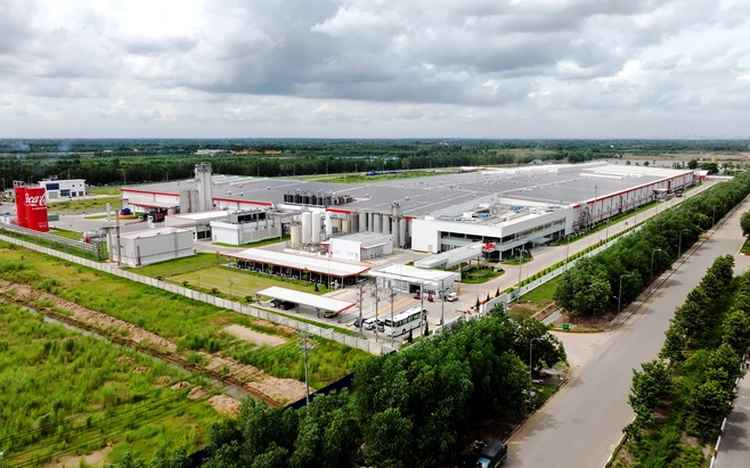
Coca-Cola Vietnam’s new factory with a total investment of US$136 million at Phu An Thanh Industrial Park in Ben Luc Commune, Tay Ninh Province, southern Vietnam. Foreign investors view Vietnam as an attractive destination. Photo: D.N.
For years, the international investment community has regarded Vietnam as an appealing destination, primarily due to its strategic geopolitical location, robust young workforce, and deep integration into various free trade agreements.
However, alongside these advantages, concerns over institutional bottlenecks, particularly the complexity of administrative procedures, continue to surface. One of the most significant barriers to foreign direct investment (FDI) is the Investment Registration Certificate (IRC).
The Cost of Red Tape
A notable FDI enterprise in southern Vietnam revealed that the adjustment of its IRC took nearly two years, while tax and land-related paperwork dragged on for over three years. Consequently, this project faced a standstill, resulting in clients withdrawing and investment capital remaining idle. Such burdensome processes, if not addressed, can effectively extinguish promising business opportunities.
According to a July 2025 survey conducted by BW Industrial in collaboration with YKVN Law Firm, 88 FDI enterprises shared their frustrations: 70.1% of respondents indicated that the IRC simply duplicates their enterprise registration certificate (ERC). Furthermore, 47.1% noted that processing times exceed the legally mandated framework of 15-30 days, with 72.4% advocating for the complete abolition of the IRC.
From the viewpoint of New Institutional Economics, these administrative procedures represent transaction costs that businesses are compelled to bear. Such costs inevitably slow down cash flow, diminish anticipated profits, and contribute to significant opportunity losses.
When we compare Vietnam with its regional counterparts, it becomes clear that Vietnam lags in terms of investment procedure timelines. In Singapore, a business can be established online in just one to two days via the BizFile portal. Meanwhile, Malaysia achieves similar results within three to five days using the MyCoID platform. Since 2018, Indonesia has streamlined its processes with the Online Single Submission system, allowing businesses to finalize registrations and licensing within hours—which has attracted tens of billions of U.S. dollars in FDI annually.
In stark contrast, the IRC persists as a mandatory procedure for the majority of projects in Vietnam. This prolongs market entry from several months to potentially years, especially in cases involving land or infrastructure. The absence of a unified digital ‘single-door’ system necessitates that businesses submit documentation to multiple agencies, further inflating costs and detracting from Vietnam’s attractiveness to global corporations that prioritize efficiency and opportunity cost.
Proposing a Shift to Post-Audit from Pre-Approval
The New Public Management theory contends that the state should act as a public service provider focused on efficiency, transparency, and responsiveness. China serves as a successful example, experiencing high productivity and double-digit economic growth for many years.
Nevertheless, the current IRC procedure reflects an outdated pre-approval governance model, heavily reliant on paperwork in the initial stages of a project. This not only burdens businesses unnecessarily but also provides little administrative advantage.
Transitioning to post-audit mechanisms—where risks are monitored during implementation—could dramatically lessen the licensing burdens, allowing the government to allocate resources toward crucial areas like environmental safety, competition, and national security. Such a shift would also align Vietnam with international norms, enhancing its competitiveness in attracting FDI.
Streamlining these procedures transcends merely saving weeks or months. It projects a vital political and economic message—that Vietnam values every investment opportunity and stands committed to fostering a transparent, efficient governance model in step with global standards.
It is indeed time to simplify or eliminate the IRC, replacing it with a more pragmatic project classification approach. For major projects that involve land or strategic infrastructure, investment approval would still be necessary; however, subsequent approvals could be limited to just an ERC. For more typical projects, procedures could be integrated into ERC processes, allowing for streamlined investment registration in cases of majority foreign ownership or restricted business categories.
This revitalized approach could significantly reduce market entry costs and encourage small and medium enterprises to participate in the supply chain, while still ensuring proper oversight in sensitive sectors.
In the realm of mergers and acquisitions, businesses advocate retaining the existing system, which is deemed transparent and user-friendly—factors that foreign investors highly value.
If these reforms are carried out, Vietnam could cut down 70-80% of FDI-related procedures, shrinking market entry timelines from months down to days. This would align it with the efficiency observed in Singapore and Malaysia and approach the remarkable speed of Indonesia.
Such changes represent more than mere technical improvements; they signal a clear institutional transition: recognizing businesses as development partners rather than subjects of control.
How to Reform Investment Procedures
Addressing the IRC bottleneck requires a multifaceted strategy with five essential solutions:
- Amend the Investment and Enterprise Laws to harmonize regulations and eliminate duplication between the IRC and ERC.
- Classify projects by risk level, maintaining oversight on large-scale or sensitive projects while streamlining procedures for standard investments.
- Fast-track the digital transformation with a national electronic single-door system, enabling businesses to finalize procedures within hours, thereby reducing corruption and enhancing transparency.
- Test and scale reforms in key FDI-attractive localities such as Bac Ninh, Dong Nai, and Ho Chi Minh City.
- Establish an independent oversight mechanism, consisting of a cross-sector council with business representation, and publicly report performance using clear KPIs focusing on processing time, cost, and satisfaction levels.
A determined effort to streamline the IRC not only unlocks valuable resources for businesses but also signals Vietnam’s commitment to institutional reform, steering the country toward a transparent, competitive, and sustainable investment landscape.